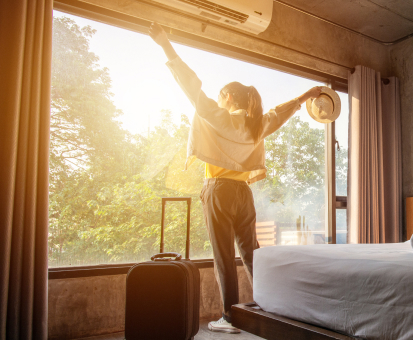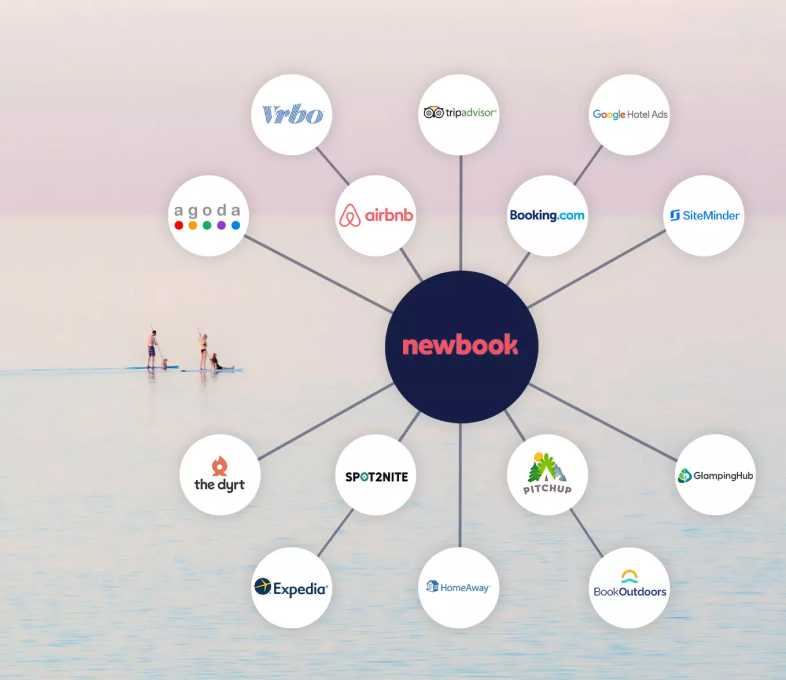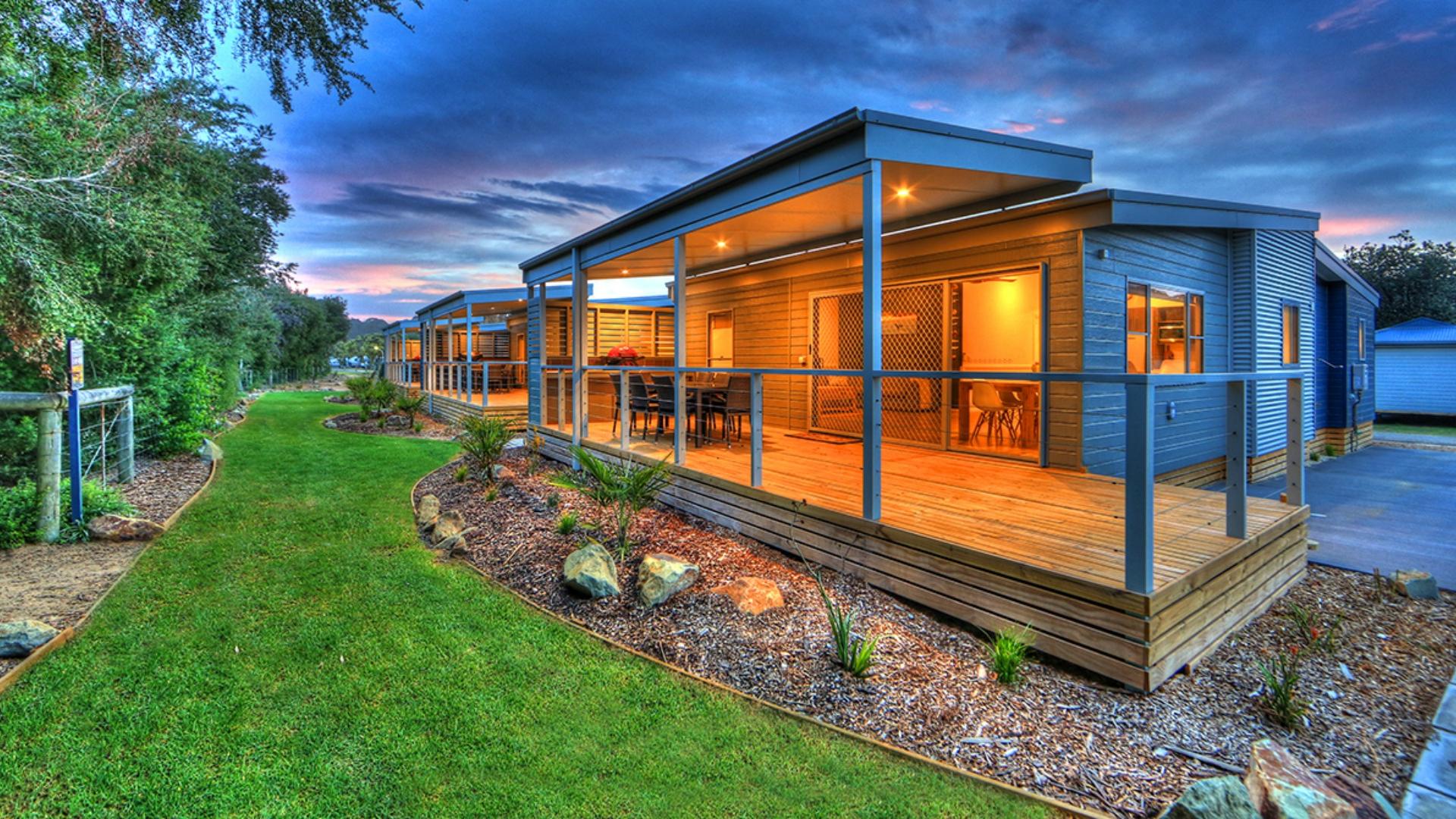
Since the start of accommodation businesses, probably hundreds or thousands of years ago (picture a hotel in ancient Egypt or in the Wild West of America—pretty cool, right?) Hoteliers and accommodation providers of all stripes have been trying to figure out a magical strategy to achieve perfect occupancy: having all rooms or sites filled throughout the year.
Of course, we know that it’s unrealistic to expect that you’ll always have ALL of your rooms or sites packed with guests, but that doesn’t mean that you can’t implement strategies to increase your revenue. Guests want variety, they want to know where they’re staying is keeping things fresh and new, whether that be through renovations or offering new services. It shows that the accommodation provider cares for their business and guests, and wants to innovate. That’s why it’s important to have strategies in your back pocket that will help you increase revenue.
By focusing on key areas like pricing, occupancy, services, and customer experience, hotels can create multiple revenue streams and encourage guests to spend more, as well as increase satisfaction. his article explores various approaches that help hotels fill rooms during peak and off-peak times, enhance the guest experience, and optimize overall profitability.
How to Maximize Hotel Revenue: Key Strategies
While there’s really no magic bullet to constantly ensuring that you’re achieving the highest revenue that your hotel can bring in, there are different strategies that you can follow to give you more revenue streams and encourage your guests to spend more. These strategies can be broken down into the following categories:
| Category | Key Strategies |
| Pricing | Use dynamic pricing to adjust room rates based on demand, seasonality, and market trends. Analyze competitor pricing regularly to stay competitive. Offer bundled packages (e.g., rooms with dining or spa services) to increase perceived value and encourage more spending. |
| Occupancy | Maximize occupancy by offering promotions during off-peak times (e.g., discounts for extended stays or event specials). Use strategic overbooking to manage cancellations, but be cautious as it may impact customer experience. Diversify target audiences, such as business travelers during the week and leisure guests on weekends, to optimize room usage. |
| Services | Increase revenue by upselling room upgrades and premium services (e.g., airport transfers, spa packages). Use in-room technology for service ordering and entertainment access to enhance the guest experience and create additional revenue opportunities. |
| Customer Experience | Focus on personalized service and guest data to create memorable experiences that drive loyalty and repeat business. Use personalized messaging and feedback collection to continuously improve. Positive online reviews and a strong reputation drive new bookings, especially through direct channels. |
1. Pricing
An effective pricing strategy is crucial for maximizing revenue. Hotels can use dynamic pricing, which adjusts room rates based on demand, seasonality, and market trends. Regularly analyzing competitor pricing can help ensure your rates remain competitive. Additionally, offering bundled packages that combine room stays with services like dining, spa treatments, or parking can increase the perceived value (a customer’s view of the benefits they’re getting versus the cost) of your accommodation business and encourage guests to spend more.
Your all-in-one, online booking system
Newbook is your all in one online booking system. Talk to us today to learn how you can improve operations and increase booking for your business.


2. Occupancy
Maximizing occupancy involves not just filling rooms but filling them at the right price. Offering targeted promotions during off-peak times, such as discounts for extended stays or local event specials, can help. Strategic overbooking is another option that accounts for last-minute cancellations, allowing hotels to maintain high occupancy levels, but it’s a bit risky of a strategy, as you may be faced with having to find alternative accommodations for guests who try to check in to find that no rooms are available. However, some accommodation providers do it anyway because it’s more cost-effective to ensure that rooms are filled rather than sit empty due to cancellations or no-shows. It can negatively affect the customer experience, so be careful when implementing this strategy. The other thing you can do is Diversify target audiences, such as attracting business travelers during the week and leisure guests on weekends, which can also optimize room usage.
3. Services
Of course, revenue doesn’t just come from room bookings—upselling and cross-selling can significantly boost income. Offering room upgrades, premium services like airport transfers, and ancillary services like spa packages, dining experiences, or event spaces helps increase revenue per guest. In-room technology allowing guests to order services or access premium entertainment also enhances the guest experience and boosts revenue opportunities.
4. Customer Experience
A strong focus on customer experience can drive repeat business and positive reviews, both of which are critical for long-term revenue growth. Personalized service, driven by guest data, can create memorable experiences, increasing loyalty and the likelihood of guests returning. Engaging with guests through personalized messaging and gathering feedback also allows for ongoing improvements. Additionally, fostering a positive online reputation encourages new bookings, particularly through direct bookings on your website.
How to Increase Hotel Revenue: Revenue Management Systems and Dynamic Pricing Tools
Maximizing hotel profits requires sophisticated strategies, and one of the most effective methods is leveraging Revenue Management Systems (RMS) and Dynamic Pricing tools. These technologies help hotels make data-driven decisions to optimize room rates and increase revenue without sacrificing guest satisfaction. The table below summarizes the main functions of these technologies:
| Tool | Functionality | Benefits |
| Revenue Management Systems | Automates room pricing by analyzing data such as occupancy rates, market demand, local events, competitor pricing, and booking patterns. | – Optimize Pricing: Recommends ideal room rates based on real-time data.- Forecast Demand: Predicts demand spikes using historical data.- Increase Efficiency: Eliminates manual calculations, freeing staff to focus on guest services. |
| Dynamic Pricing | Adjusts room rates in real-time based on demand, competition, and seasonality. | – Maximize Revenue: Adjust rates higher during high demand and lower during slow periods.- Stay Competitive: Adjust pricing instantly to match competitors.- Capture Last-Minute Bookings: Offer competitive rates for same-day bookings to fill empty rooms. |
By combining RMS and dynamic pricing tools, hotels can ensure they are always offering the right price at the right time, leading to maximized profits and better overall performance. This technology-driven approach not only boosts revenue but also enhances decision-making, helping hotels stay competitive in a rapidly evolving market.
How to Increase Hotel Room Revenue: Optimizing Occupancy and Pricing

Maximizing hotel room revenue is essential for maintaining profitability in a competitive market. By optimizing occupancy and pricing strategies, hotels can increase their revenue while delivering a better guest experience. Here are key strategies to boost room revenue:
1. Implementing Yield Management and Dynamic Pricing
To maximize revenue, hotels need to adjust room rates based on demand, market trends, and occupancy levels. Yield management is a pricing strategy that optimizes room revenue by selling the right room at the right price to the right customer at the right time. Combining this pricing strategy with dynamic pricing allows hotels to:
- Raise prices during high-demand periods (e.g., holidays, local events).
- Offer discounted rates during low-demand times to increase occupancy.
- Regularly monitor competitors’ pricing to stay competitive without compromising profitability.
2. Offering Flexible Rates for Different Guest Segments
Tailoring rates to specific guest segments can help drive bookings. Hotels can offer flexible pricing for different groups, such as:
- Business Travelers: Offering weekday deals, loyalty discounts, or corporate packages.
- Leisure Tourists: Providing weekend or family vacation packages that include activities or dining experiences.
- Groups and Events: Offering special rates for weddings, conferences, or other group bookings, which often result in multiple room reservations.
3. Utilizing Upselling and Cross-Selling Strategies
Increasing Average Daily Rate (ADR) can be achieved through upselling and cross-selling:
- Room Upgrades: Offer guests the opportunity to upgrade to a premium room or suite for an additional fee.
- Add-On Services: Encourage guests to purchase additional services such as breakfast packages, spa treatments, or airport transfers.
- Cross-Selling: Promote in-house dining, tours, or experiences that guests can book during their stay.
These strategies enhance the guest experience while generating additional revenue.
4. Maximizing Revenue as a Small Hotel
For small hotels, offering personalized services and unique experiences is a key differentiator. This can include:
- Customized Packages: Curate personalized stays, such as romantic getaways, adventure trips, or wellness retreats.
- Local Experiences: Partner with local businesses to offer exclusive experiences like tours, tastings, or cultural activities that appeal to niche markets.
- Personalized Guest Services: Offer tailored services, such as special welcome packages or flexible check-in/out options, to create a memorable experience that drives guest loyalty and repeat bookings.
5. Using Data Analytics to Personalize Offers
Analyzing guest data collected by your property management system can help hotels create targeted offers that cater to specific preferences and habits, leading to increased bookings and upsells.
- Personalized Promotions: Tailor offers based on guest history, such as discounts on favorite services or amenities.
- Segmentation: Group guests by demographics or booking behavior to deliver relevant promotions (e.g., targeting families with kid-friendly packages).
- Predictive Analytics: Use data analytics to forecast future demand and optimize pricing and services accordingly.
By focusing on these strategies, hotels of any size can optimize occupancy, enhance pricing, and ultimately boost room revenue.
How to Increase Hotel Revenue in Low Season
Maximizing hotel revenue during low season requires creative strategies to attract guests when demand is naturally lower. Here are some key approaches to boost bookings and maintain profitability during off-peak periods:
1. Offering Off-Season Promotions, Packages, and Discounts
One of the most effective ways to increase hotel revenue in low season is by offering special promotions and discounts:
- Off-Season Discounts: Provide reduced rates to incentivize bookings during slow periods.
- Value-Added Packages: Create packages that bundle room stays with extras like complimentary breakfast, spa services, or guided tours to make the offer more attractive.
- Extended Stay Deals: Offer discounted rates for longer stays, encouraging guests to spend more time at your property. Promotions like these can help fill rooms that might otherwise remain empty, driving revenue even when demand is low.
2. Targeting Niche Markets
During low season, it’s essential to shift focus to market segments that are less affected by seasonality:
- Locals: Attract local guests by offering “staycation” deals, weekend getaways, or spa packages that provide a quick escape close to home.
- Off-Season Tourists: Target travelers who prefer to avoid crowds, promoting the benefits of visiting your location during the quieter months.
- Business Retreats and Conferences: Reach out to businesses and organizations by offering discounted rates for corporate retreats, conferences, or team-building events. Many companies are flexible with off-peak booking times, and group bookings can significantly boost occupancy.
3. Partnering with Local Businesses and Tourism Boards
Collaboration with local businesses and tourism boards can create appealing packages that enhance the guest experience and attract off-season travelers:
- Local Business Partnerships: Team up with nearby restaurants, spas, tour operators, or attractions to create bundled experiences, offering guests a unique and memorable stay at a lower cost.
- Tourism Board Promotions: Work with tourism boards to promote off-season travel to your area. They may offer marketing support or help create special events that draw visitors during slow periods.
- Exclusive Events and Festivals: Hosting or sponsoring off-season events, such as food festivals, art exhibits, or seasonal activities, can provide a reason for guests to visit your hotel during the low season.
4. Leveraging Social Media and Influencer Marketing
During the low season, actively promoting your hotel on social media can help attract new guests and generate interest:
- Seasonal Campaigns: Run off-season campaigns highlighting your hotel’s unique features or special promotions.
- Influencer Collaborations: Partner with local influencers or travel bloggers to showcase your hotel as a great off-season destination, encouraging their followers to book.
- User-Generated Content: Encourage past guests to share their experiences on social media, creating organic promotion for your hotel.
5. Promoting Flexible Booking Policies
Offering flexible cancellation and rescheduling policies can encourage more bookings during the low season, especially for guests who may be uncertain about their travel plans:
- Free Cancellation: Allow guests to cancel without penalty up to a certain date, making your hotel a more attractive option.
- Booking Changes: Offer flexibility to modify bookings without fees, which can boost guest confidence in making reservations during unpredictable off-season months.
How to Increase Hotel Room Service Revenue

Maximizing hotel room service revenue requires creativity, convenience, and a focus on guest satisfaction. Here are key strategies to boost your room service earnings:
1. Creative Menu Options and Promotions
- Introduce unique or seasonal menu options to intrigue guests, such as local specialties or health-conscious meals.
- Offer room service promotions, such as “happy hour” discounts or bundled meals (e.g., dinner and dessert packages).
- Rotate special offers regularly to keep the menu fresh and encourage guests to try something new during their stay.
2. Value-Added Services
- Provide premium room service packages, such as gourmet breakfasts or romantic dinner setups for special occasions.
- Introduce themed dining experiences (e.g., movie-night menus with snacks and drinks) to create a memorable and exclusive feel.
- Customize room service packages for different guest segments, such as business travelers (quick meals) or families (kid-friendly menus).
3. Convenient Ordering Systems
- Implement easy-to-use mobile apps or in-room tablets to streamline the ordering process and allow guests to browse the menu and place orders effortlessly.
- Offer 24/7 ordering with an intuitive interface that displays real-time menu updates and estimated delivery times.
4. Optimizing Delivery Speed and Quality
- Focus on timely and efficient delivery to ensure food arrives fresh and at the right temperature, improving overall guest satisfaction.
- Continuously monitor and improve the quality of room service, ensuring that orders are accurate, well-presented, and delivered with a friendly touch.
- Use guest feedback to refine and enhance room service operations, encouraging repeat orders and higher tips.
5. Upselling Beverage and Snack Options
Room service doesn’t need to be limited to full meals—upselling additional items can significantly increase revenue:
- Beverage Add-Ons: Suggest pairing meals with wine, cocktails, or premium beverages, and offer specialty drink packages.
- Snack Packages: Offer guests late-night snacks, healthy options, or dessert add-ons to encourage additional orders.
- Mini Bar Customization: Allow guests to customize their in-room mini-bar options with premium snacks or drinks, increasing spending per room.
6. Room Service Subscription Packages
Offer room service as part of bundled subscription options that encourage frequent use:
- Daily Meal Plans: Offer packages that include breakfast, lunch, and dinner for an entire stay at a discounted rate.
- All-Inclusive Packages: Provide an all-inclusive room service option where guests pay a fixed rate for unlimited room service during their stay.
- Membership Benefits: Reward loyalty members with free room service for specific meals or discounts on premium dining options.
7. Cross-Promote In-House Dining Venues
Use room service to promote on-site restaurants and bars, creating more touchpoints for revenue:
- Exclusive Room Service Specials: Feature popular dishes from the hotel’s restaurant menu exclusively available via room service.
- Dining Reservations: Encourage guests to make in-house dining reservations by promoting restaurant offers or dining events through room service menus.
- Special Tastings: Offer limited-time tasting menus or chef’s specials through room service to highlight the in-house dining experience.
8. Promote Room Service for Special Occasions
Target special occasions to drive more room service orders:
- Celebration Packages: Provide tailored packages for birthdays, anniversaries, or honeymoons, including room service meals, desserts, and décor.
- Holiday-Themed Menus: Introduce special room service menus during holidays, such as Valentine’s Day, Christmas, or New Year’s Eve, to attract guests seeking a cozy in-room experience.
- Personalized Touches: Offer guests the option to add personalized items like nameplates, handwritten notes, or themed décor with their room service order.
How to Maximize Revenue with Direct Bookings

Maximizing direct bookings is one of the most effective ways for hotels to increase revenue by reducing the reliance on third-party platforms that charge commissions. Here are key strategies to boost direct bookings:
1. Reducing Reliance on Third-Party Booking Platforms
- Third-party platforms like OTAs (Online Travel Agencies) take a significant percentage of your revenue through commissions. Listing with OTAs is a great idea, because the billboard effect helps steer guests to your website for direct bookings. In addition, if a guest books with an OTA the first time and has a positive experience with you, then the likelihood of them booking directly with you next time increases.
- Focus on building your brand’s online presence and encouraging guests to visit your website rather than relying on intermediaries for reservations.
More bookings, more often with our built in channel manager
Newbook is your all in one property management software. Talk to us today to learn how you can inprove operations and increase bookings for your business.


2. Driving Direct Bookings Through Your Hotel’s Website
- Search Engine Optimization (SEO): Help your website rank highly on search engines through targeted keywords, optimized content, and a mobile-friendly interface. This helps drive organic traffic to your booking page.
- Paid Advertising: Invest in pay-per-click (PPC) campaigns, such as Google Ads, and social media advertising to target potential guests directly. Display special promotions that are only available through your website.
- Special Offers: Provide exclusive discounts or perks for guests who book directly, such as complimentary breakfast, room upgrades, or late check-out. Clearly advertise these offers on your website and marketing materials to entice direct bookings.
3. Incentivizing Direct Bookings with Loyalty Programs
- Implement a loyalty program that rewards repeat guests for booking directly through your website. Offer points, discounts, or exclusive benefits for loyal customers.
- Provide exclusive discounts and promotions that are only available to guests who book directly, making it more appealing than using third-party platforms.
- Regularly communicate with past guests through email marketing, offering them special rates and packages for their next stay if they book directly.
Conclusion
Increasing hotel revenue requires a combination of strategic pricing, occupancy management, personalized services, and a strong focus on customer satisfaction. By leveraging technology such as RMS and dynamic pricing tools, hotels can optimize room rates and enhance decision-making. Creative offerings like unique room service packages, off-season promotions, and exclusive direct booking incentives can also drive guest engagement and loyalty. With the right balance of innovative strategies and personalized experiences, hotels can consistently maximize revenue and ensure long-term growth and success in the hospitality industry.
Get the property management system that integrates your RMS and booking functionality for a seamless experience. Get a free demo.
So you manage a hotel? We make it easy
Newbook is your all in one hotel management software. Talk to us today to learn how you can improve operations and increase bookings for your hotel.


